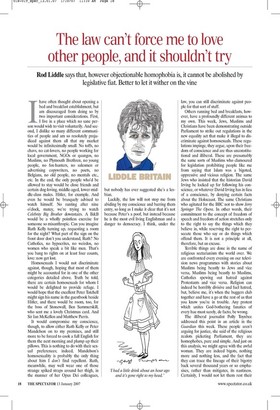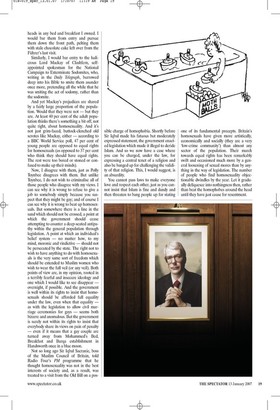The law can't force me to love other people, and it shouldn't try
Rod Liddle says that, however objectionable homophobia is, it cannot be abolished by legislative fiat. Better to let it wither on the vine Ihave often thought about opening a bed and breakfast establishment, but am discouraged from doing so by two important considerations. First, I live in a place which no sane person would wish to visit voluntarily. And second, I dislike so many different communities of people and am so resolutely prejudiced against them all that my market would be infinitesimally small. No toffs, no chavs, no cat-lovers, no people working for local government, NGOs or quangos, no Muslims, no Plymouth Brethren, no young people, no fox-hunters, no salesmen or advertising copywriters, no poets, no Belgians, no old people, no mentals etc., etc. In the end, the only people who'd be allowed to stay would be close friends and certain dog-loving, middle-aged, lower-middle-class males. Hitler, for example. And even he would be brusquely advised to watch himself. No ranting after nine o'clock, matey, we're trying to watch Celebrity Big Brother downstairs. A B&B would be a wholly pointless exercise for someone so misanthropic. Can you imagine Ruth Kelly turning up, requesting a room for the night? What part of the sign on the front door don't you understand, Ruth? No Catholics, no hypocrites, no weirdos, no women who speak a bit like men. That's you bang to rights on at least four counts, love: now get lost.
Homosexuals I would not discriminate against, though, hoping that most of them might be accounted for in one of the other categories detailed above. Truth be told, there are certain homosexuals for whom I would be delighted to provide refuge. I would hope that the excellent Peter Tatchell might sign his name in the guestbook beside Hitler, and there would be room, too, for the boss of Stonewall, Ben Summerskill, who sent me a lovely Christmas card. And Sir Ian McKellen and Matthew Parris.
It would compromise my conscience, though, to allow either Ruth Kelly or Peter Mandelson on to my premises, and still more to be forced to cook a full English for them the next morning and plump up their pillows. This is nothing to do with their sexual preferences; indeed, Mandelson's homosexuality is probably the only thing about him I don't find repellent. Ruth, meanwhile, may well wear one of those strange spiked straps around her thigh, in the manner of her Opus Dei colleagues, but nobody has ever suggested she's a lesbian.
Luckily, the law will not stop me from abiding by my conscience and barring them entry, so long as I make it clear that it's not because Peter's a poof, but instead because he is the most evil living Englishman and a danger to democracy. I think, under the law, you can still discriminate against people for that sort of stuff.
Others running bed and breakfasts, however, have a profoundly different animus to my own. This week, Jews, Muslims and Christians have been demonstrating outside Parliament to strike out regulations in the new equality act that make it illegal to discriminate against homosexuals. These regulations impinge, they argue, upon their freedom of conscience and are thus unconstitutional and illiberal. These are presumably the same sorts of Muslims who clamoured for legislation prohibiting people like me from saying that Islam was a bigoted, oppressive and vicious religion. The same Jews who insisted that the historian David Irving be locked up for following his conscience, or whatever David Irving has in lieu of a conscience, by denying certain facts about the Holocaust. The same Christians who agitated for the BBC not to show Jerry Springer The Opera. In other words, their commitment to the concept of freedom of speech and freedom of action stretches only to the right to say the things which they believe in, while reserving the right to persecute those who say or do things which offend them. It is not a principle at all, therefore, but an excuse.
Terrible things are done in the name of religious sectarianism the world over. We are confronted every evening on our television news programmes with stories about Muslims being beastly to Jews and vice versa, Muslims being beastly to Muslims, Catholics spewing out hatred against Protestants and vice versa. Religion can indeed be horribly divisive and fuel hatred, but, believe me, it's when the buggers club together and have a go at the rest of us that you know you're in trouble. Any protest which unites God-bothering fanatics of every hue must surely, de facto, be wrong.
The illiberal journalist Polly Toynbee addressed this point in an article in the Guardian this week. These people aren't arguing for justice, she said of the religious zealots picketing Parliament, they are homophobes, pure and simple. And just on this analysis, we might agree with the awful woman. They are indeed bigots, nothing more and nothing less, and the fact that they can trace the lineage of their bigotry back several thousand years or so emphasises, rather than mitigates, its nastiness. Certainly, I would not let them rest their heads in any bed and breakfast I owned. I would bar them from entry and pursue them down the front path, pelting them with stale chocolate cake left over from the Fithrer's last visit.
Similarly, I would bar entry to the ludicrous Lord Mackay of Clashfern, selfappointed spokesman for the National Campaign to Exterminate Sodomites, who, writing in the Daily Telegraph, burrowed deep into his Bible to smite them asunder once more, pretending all the while that he was smiting the act of sodomy, rather than the sodomite.
And yet Mackay's prejudices are shared by a fairly large proportion of the population. Would that they were not — but they are. At least 40 per cent of the adult population thinks there's something a bit off, not quite right, about homosexuality. And it's not just grim-faced, buttock-clenched old scrotes like Mackay, either — according to a BBC World Service poll, 47 per cent of young people are opposed to equal rights for homosexuals (as opposed to 37 per cent who think they should have equal rights. The rest were too bored or stoned or confused to make up their minds).
Now, I disagree with them, just as Polly Toynbee disagrees with them. But unlike Toynbee, I do not wish to criminalise all of those people who disagree with my views. I can see why it is wrong to refuse to give a job to somebody simply because you suspect that they might be gay; and of course I can see why it is wrong to beat up homosexuals. But somewhere there is a line in the sand which should not be crossed, a point at which the government should cease attempting to counter a deep-seated antipathy within the general population through legislation. A point at which an individual's belief system — no matter how, to my mind, moronic and vindictive — should not be persecuted by the state. The right not to wish to have anything to do with homosexuals is the very same sort of freedom which should be extended to Muslim women who wish to wear the full veil (or any veil). Both points of view are, in my opinion, rooted in a terribly fearful and insecure ideology and one which I would like to see disappear — overnight, if possible. And the government is well within its rights to insist that homosexuals should be afforded full equality under the law, even when that equality — as with the legislation to allow civil marriage ceremonies for gays — seems both bizarre and anomalous. But the government is surely not within its rights to insist that everybody share its views on pain of penalty — even if it means that a gay couple are turned away from Mohammed's Bed, Breakfast and Burqa establishment in Handsworth once in a blue moon.
Not so long ago Sir Iqbal Sacranie, boss of the Muslim Council of Britain, told Radio Four's PM programme that he thought homosexuality was not in the best interests of society and, as a result, was treated to a visit from the Old Bill on a possible charge of homophobia. Shortly before Sir Iqbal made his fatuous but moderately expressed statement, the government enacted legislation which made it illegal to deride Islam. And so we now have a case where you can be charged, under the law, for expressing a central tenet of a religion and also be banged up for challenging the validity of that religion. This, I would suggest, is an absurdity.
You cannot pass laws to make everyone love and respect each other, just as you cannot insist that Islam is fine and dandy and then threaten to bang people up for stating one of its fundamental precepts. Britain's homosexuals have given more artistically, economically and socially (they are a very low-crime community') than almost any sector of the population. Their march towards equal rights has been remarkably swift and occasioned much more by a general loosening of sexual mores than by anything in the way of legislation. The number of people who find homosexuality objectionable dwindles by the year. Let it gradually deliquesce into nothingness then, rather than beat the homophobes around the head until they have just cause for resentment.























































 Previous page
Previous page